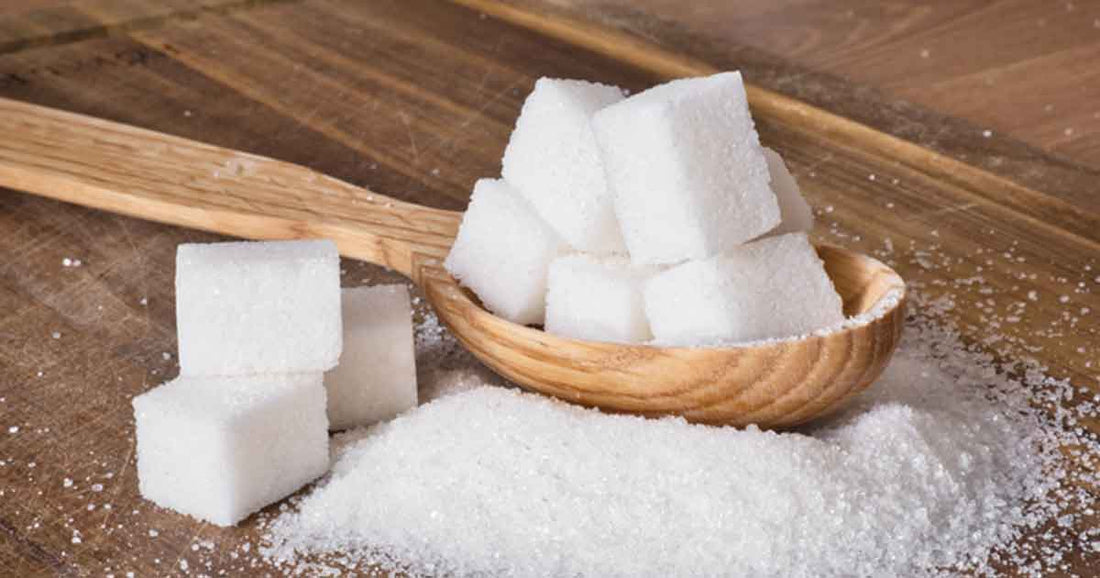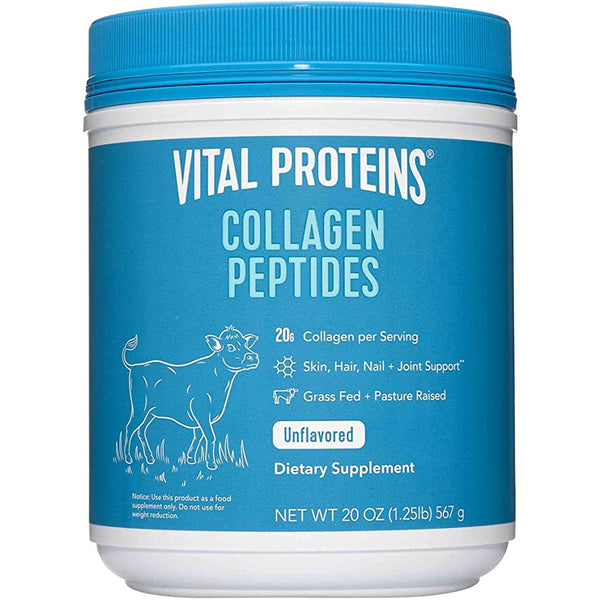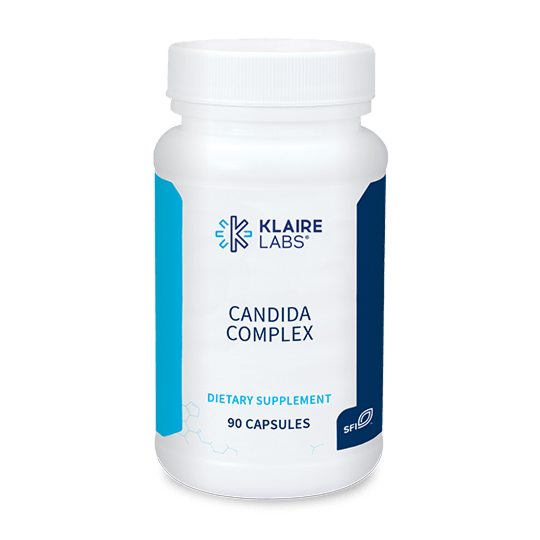7 Hidden Dangers of Sugar

Share
Halloween is a time of year when kids (and adults) indulge in their favorite sweet treats. While they taste good, these candies are extremely high in sugar. In this article, we will discuss the hidden dangers of sugar and list the top sugar substitutes.
Too Much Sugar?
The WHO recommends both adults and children consume no more than 10% of their diet from added sugars. Unfortunately, the average American consumes 20 teaspoons (80 grams) of sugar daily. This is more than double the suggested daily amount for men (9 teaspoons) and (6 teaspoons) for women.
Dangers of Too Much Sugar
Sugar can impact the body in many surprising ways.
#1. Highly Addictive
Studies on sugar indicate it could play a key role in food addiction. When consumed, sugar can release both opioids and dopamine in the brain. Like addictive drugs, those addicted to sugar can exhibit the four common signs of addiction: binges, withdrawal, craving, and cross-sensitization (the risk of adverse drug reactions or increased intake of a different drug).
Studies on rats found after one month of consuming a beverage with sugar, they exhibited classic addiction qualities:[1]
- Consuming large amounts of the sugary solution via bingeing
- Exhibiting withdrawal symptoms similar to those of opiate users (anxiety and depression)
- Intense cravings when the sugar was no longer accessible
- Signs of “cross-sensitization” in both consummatory and locomotor systems
Parents must be aware of this risk and are advised to limit their children’s candy consumption.
#2. Sugar and Blood Sugar Regulation
Diets high in sugars have been linked to an increased risk of insulin resistance. Produced by the pancreas, insulin allows cells in the body to absorb glucose in the blood and use it for energy. Insulin resistance occurs when cells fail to respond normally to insulin. Over time, this could cause high blood sugar levels, eventually leading to blood sugar balancing issues.[2]
#3. Difficulty Conceiving
Diets high in sugar and saturated fats have been linked to poor fertility in both men and women. In men, high sugar intake may be associated with lower semen quality and increased infertility. Women who consumed three or more servings of soda per day had a 52% pregnancy rate compared to women who did not have any soda consumption.[3]
#4. Heart Issues
Sugar may be associated with heart health issues that affect the heart and blood vessels, including stroke, high blood pressure, heart attack, and atherosclerosis. Higher consumption rates of added sugar have been associated with an increased risk of cardiovascular disease.
The higher sugar intake increased other negative changes in the body that increased the risk of CVD, such as weight gain (obesity) and waist circumference. Researchers note a reduction of sugar consumption to less than 10% of energy intake is key to lowering the risk of cardiovascular disease.[4]
#5. Cell Mutations
Countless studies on cell mutations find that excess sugar consumption may contribute to cellular changes. Researchers note diets high in sucrose and high fructose corn syrup could activate several actions in the body linked to cell mutations, including inflammation, glucose, and metabolic syndrome.[5]
#6. Aging skin
Sugar has been shown to disrupt collagen formation on the skin. Collagen accounts for nearly 30% of the body’s protein, providing strength and support for the skin, bones, muscles, and connective tissues. Consuming too much sugar has been shown to “cross-link” collagen fibers, rendering them useless and incapable of skin repair.[6]
#7. Candida
Candida is a fungal infection, which is a type of yeast. It can affect the mouth, genitals, skin, and other body parts. It is also known as “thrush,” or yeast infection if it affects the vagina. Sugar is known to encourage the growth of candida. For both Candida albicans and Candida glabrata, glucose has been identified as a key source of nutrients that allows them to grow and increase.[7]
How to Decrease Sugar Consumption
Decreasing sugar consumption to recommended levels is strongly advised. Here are the top ways to lower sugar consumption:
- Limit consumption of processed foods. Many processed foods are high in sugar.
- Check labels for high fructose corn syrup. In addition to candy, here are a few surprising sources of high fructose corn syrup:
- Applesauce
- Barbeque sauce
- Protein powder
- Bread
- Breakfast cereal
- Canned fruit
- Canned tomatoes (commercial tomato soup)
- Dried fruit
- Choose healthier sugar substitutes. Here are the best and worst sugar replacements.
|
Best Sugar Substitutes |
Worst Sugar Substitutes |
|
Maple syrup |
High fructose corn syrup |
|
Raw honey |
Artificial sweeteners |
|
Blackstrap molasses |
Agave syrup |
|
Brown sugar |
Sucralose |
|
Organic coconut sugar |
Saccharin |
|
Evaporated cane juice |
Aspartame |
Note: Check recipes for proper sugar substitute ratios. Some sugar alternatives may require more (or less) amounts in recipes than traditional sugar.
Sugar Supplements and Sugar Relief Products
All-natural products are available to help limit some of the effects of excess sugar has on the body:
CAND:PLUS 
CAND:PLUS helps to relieve many of the symptoms involved with a candida infection, including sugar cravings, drowsiness, nausea, congestion, itching, vaginal discharge, and lethargy. This all-natural product comes in liquid form allowing it to be readily absorbed by the body for immediate use and relief.
Spoonable Stevia Packets 
The perfect sugar alternative,Spoonable Stevia Packets is as sweet as 3 packets of sugar. To control the sweetness, the powder is packaged in smaller serving sizes. This product is USDA certified organic grown, blended with sugar alcohol, fruit, grains, organic erythritol, and vegetables, which are used as a bulking agent.Spoonable Stevia Packets are all-natural, and free of sugar, fructose, gluten, aspartame, artificial sweeteners or other harmful ingredients.
Collagen Peptides 
Consuming too much sugar can have a devastating impact on the skin. Collagen Peptides are short-chain amino acids that come from pasture-raised collagen. This product can be added to both hot and cold liquids, making it an ideal option for those looking to boost their collagen levels.
Candida Complex 
Candida Complex is a powerful formula specifically designed to help rid the body of candida as well as maintain and restore a healthy and balanced microbiota in the gastrointestinal tract.
Summary
Sugar can affect the body in many ways. It is possible a person is unknowingly suffering from health issues caused by excess sugar consumption. Starting today, try to limit your sugar consumption and opt for healthier sugar alternatives. Your body will thank you.
References:
- Nicole M. Avena, Pedro Rada, Bartley G. Hoebel. Evidence for sugar addiction: Behavioral and neurochemical effects of intermittent, excessive sugar intake. Neurosci Biobehav Rev. 2008; 32(1): 20–39. Published online 2007 May 18. doi: 10.1016/j.neubiorev.2007.04.019. [PMID: 17617461].https://www.ncbi.nlm.nih.gov/pmc/articles/PMC2235907/
- I. A. Macdonal. Eur J Nutr. 2016; 55(Suppl 2): 17–23. Published online 2016 Nov 23. doi: 10.1007/s00394-016-1340-8. [PMID: 27882410].https://www.ncbi.nlm.nih.gov/pmc/articles/PMC5174139/
- Neelima Panth, Adam Gavarkovs, Martha Tamez, (et al). The Influence of Diet on Fertility and the Implications for Public Health Nutrition in the United States. Front Public Health. 2018; 6: 211. Published online 2018 Jul 31. doi: 10.3389/fpubh.2018.00211. [PMID: 30109221].https://www.ncbi.nlm.nih.gov/pmc/articles/PMC6079277/
- Aryati Ahmad 1 2, Cheryl Isherwood 2, Margot Umpleby, (et al). Effects of High and Low Sugar Diets on Cardiovascular Disease Risk Factors. J Nutr Sci Vitaminol (Tokyo). 2020;66(Supplement):S18-S24. doi: 10.3177/jnsv.66.S18. [PMID: 33612591].https://pubmed.ncbi.nlm.nih.gov/33612591/
- Margeaux Epner, Peiying Yang, Richard W Wagner. Understanding the Link between Sugar and Cancer: An Examination of the Preclinical and Clinical Evidence. Cancers (Basel). 2022 Dec 8;14(24):6042. doi: 10.3390/cancers14246042. [PMID: 36551528].https://pubmed.ncbi.nlm.nih.gov/36551528/
- F William Danby. Nutrition and aging skin: sugar and glycation. Clin Dermatol. 2010 Jul-Aug;28(4):409-11. doi: 10.1016/j.clindermatol.2010.03.018. [PMID: 20620757].https://pubmed.ncbi.nlm.nih.gov/20620757/
- Mieke Van Ende, Stefanie Wijnants, Patrick Van Dijck. Sugar Sensing and Signaling in Candida albicans and Candida glabrata. Front Microbiol. 2019 Jan 30:10:99. doi: 10.3389/fmicb.2019.00099. eCollection 2019. [PMID: 30761119]. https://pubmed.ncbi.nlm.nih.gov/30761119/
